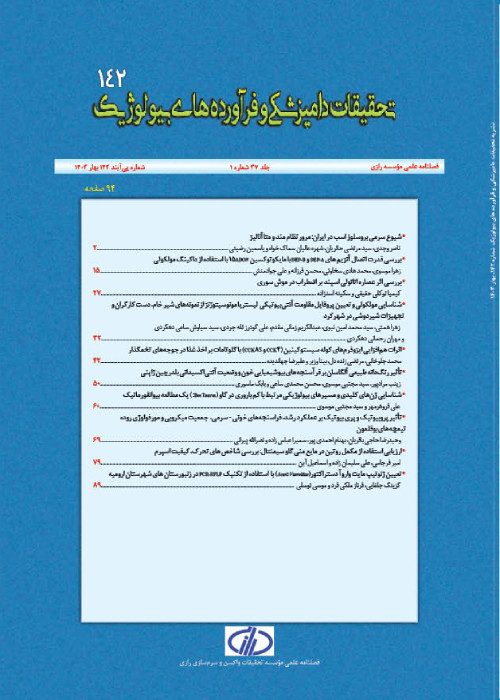A Glance at the Immunity and Vaccines against Tropical Theileriosis
Author(s):
Abstract:
Tropical Theileriosis is caused by infection of bovine myeloid mononuclear cells (Monocytes and macrophages) and lymphoid cells (B lymphocytes) as well as red blood cells by the protozoan parasite Theileria annulata. The disease is transmitted by ticks of the genus Hyalomma. The clinical signs of theileriosis in stages appear from mild symptoms to serious، including fever and anemia to severe involvement of lymphoid organs that can cause death. The cellular immunity is a main part of effective and protective against Theileria infection as an intracellular protozoan، but the humoral immunity with specific antibody had a neutralizing effect directed against extracellular sporozoites and merozoites. But the adaptive cell-mediated immunity is driven by activation of T cells، macrophages and natural killer cells (NKC) and their derivatives like as IFN-gamma and TNF-alpha can respond to schizont infected cells، particularly CD8+ T cells kill these infected cells and remain as memory T cells for the next parasite challenge. However، the innate immune response such as the complement system and phagocytic cells is believed to play an important role in protecting against bovine theileriosis especially during primary stage of Theileria infection. Iran as a sub-tropical region and the Hyalomma spp. vector for transmission of the Theileria annulata make the Theileriosis as an endemic disease. The circulating Theileria parasites in carrier domestic and wild ruminants، and tick infestation make Theileriosis more difficult to control، therefore many efforts have been performed for producing the efficient bovine theileriosis vaccine. The recombinant candidate vaccines have been produced based on the merozoite and sporozoite stages of the protozoa and examined experimentally with partially success in the field. However، live attenuated Theileria annulata with cell culture methodology induced a strong، antigen-specific CTL activity for recognition by schizont antigen-specific cytotoxic T lymphocytes. Based on nearly four decades of our practical experiences on vaccination in Iran and the World Organisation for Animal Health (OIE) and the Food and Agriculture Organization of the United Nations (FAO) recommendations، the live attenuated vaccine is recommended as evidence-based strategies to control T. annulata infection by active immunization of susceptible exotic cattle and their cross-breds.
Keywords:
Language:
Persian
Published:
Veterinary Researches and Biological Products, Volume:27 Issue: 2, 2014
Pages:
70 to 79
magiran.com/p1291256
دانلود و مطالعه متن این مقاله با یکی از روشهای زیر امکان پذیر است:
اشتراک شخصی
با عضویت و پرداخت آنلاین حق اشتراک یکساله به مبلغ 1,390,000ريال میتوانید 70 عنوان مطلب دانلود کنید!
اشتراک سازمانی
به کتابخانه دانشگاه یا محل کار خود پیشنهاد کنید تا اشتراک سازمانی این پایگاه را برای دسترسی نامحدود همه کاربران به متن مطالب تهیه نمایند!
توجه!
- حق عضویت دریافتی صرف حمایت از نشریات عضو و نگهداری، تکمیل و توسعه مگیران میشود.
- پرداخت حق اشتراک و دانلود مقالات اجازه بازنشر آن در سایر رسانههای چاپی و دیجیتال را به کاربر نمیدهد.
In order to view content subscription is required
Personal subscription
Subscribe magiran.com for 70 € euros via PayPal and download 70 articles during a year.
Organization subscription
Please contact us to subscribe your university or library for unlimited access!


